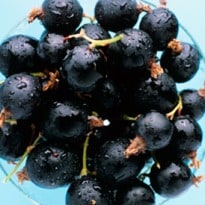Blackcurrants are packed with vitamin C and micronutrients - they're Britain's very own superfood.
Blackcurrants are much too good to be relegated to jams and cordials. In all their purple might, they have an intensely punchy flavour, unmatched even by damsons or raspberries. And while those ubiquitous blueberries often disappoint, blackcurrants always deliver. Just a handful brings colour and a tangy tart edge to everything from summer pudding to creamy fool. One blackcurrant leaf adds a blousy perfume to a glass of chilled Pimm's.
It's criminal that fresh British blackcurrants are given so little retail shelf space during their season. They only need a quick pick over, and the results are an ample reward. The ready-to-use frozen sort is not to be sniffed at, either. Blackcurrants freeze well and make a fantastic, near instant compote. They're wonderful in porridge too.
Why are blackcurrants good for me?
Blackcurrants contain sumptuously rich levels of health-promoting micronutrients, even compared with other "superfood" berries. They are an exceptionally rich source of vitamin C - containing three times more than oranges - and natural phenolic compounds, notably anthocyanins. This winning combination appears to bestow an anti-inflammatory effect, promoting cardiovascular and brain health, and offering some protection against age-related eye problems. Some research suggests the phenolic compounds help prevent urinary tract infections and relieve the symptoms.
Where to buy and what to pay
Blackcurrants are all the reason you need for a summertime expedition to a fruit farm. They'll be much cheaper than those sold in piffling quantities in the supermarket. Guide price per kg: ready-picked £7.50; pick-your-own £4.25; frozen £3.50-£6.
Joanna Blythman is the author of What To Eat (Fourth Estate, £9.99). To order a copy for £7.99 with free UK p&p, go to guardianbookshop.co.uk
Blackcurrant and lemon posset
Lemon and blackcurrant is a heavenly marriage of tart flavours that takes sweetening beautifully. This lovely summer pudding can be made well in advance. I usually serve the posset with a biscuit of some sort - something with a hint of almond always seems to be a good choice.
Serves 4
300g blackcurrants, washed, stalks and stems removed
25g icing sugar
400ml cream
Rind of 1 lemon
125g caster sugar
Juice of 2 lemons
1 Put the blackcurrants in a pan with 1 tbsp water. Bring to a simmer and cook for five or so minutes, until soft and pulpy.
2 Remove from the heat and, while still warm, sift in the icing sugar and stir to dissolve. Taste and add more icing sugar if necessary - you want to carefully balance the sweetness and tart flavours. Leave to cool while you make the posset.
3 Put the cream into a pan with the strips of lemon rind, and bring to a scald. Add the caster sugar and stir until dissolved.
4 Turn up the heat and stir in the lemon juice. Simmer for around 3 minutes. Take off the heat and leave to settle for a few minutes.
5 Strain the mixture through a fine sieve into a large jug, discarding the lemon rind.
6 Carefully divide the sweetened blackcurrants between 4 glasses or ramekins, then gently pour the posset on top.
7 Cool to room temperature, then place in the fridge and leave to set for at least four hours, or preferably overnight.
Rosie Sykes is head chef of Fitzbillies (fitzbillies.com) and co-author of The Kitchen Revolution (Ebury Press, £25). To order a copy for £19.99 with free UK p&p, go to guardianbookshop.co.uk
Blackcurrants: three times more vitamin C than oranges... Photograph: Joerg Lehmann/Getty Images/StockFood









